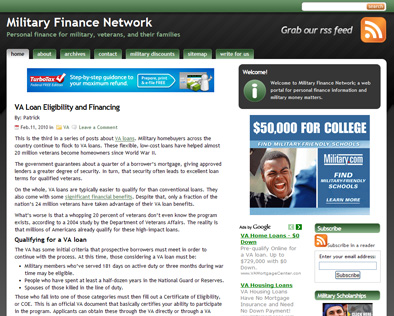 |
 |
|
|
Cash Money Life: An Interview with Patrick
Cash Money Life is one of the top personal finance blogs on the Internet, and fortunately for us, its founder Patrick agreed to an interview. If you run a search on Google for any sort of Roth IRA related information, you're almost certain to run across a post by Patrick. So pull up a chair and join me in welcoming Patrick from Cash Money Life to Your Roth IRA...
1) Patrick, thanks for sharing your valuable time with us. You have one of the best personal finance blogs on the Internet, and some of your best posts (such as How To Open A Roth IRA and Best Brokerages For A Roth IRA) directly address the real bread and butter of this site. Please tell us a little bit about yourself and Cash Money Life. Thanks for the compliments, Britt. I started Cash Money Life three years ago to share my passion about personal finance. I had recently separated from the USAF and in the beginning I blogged about personal finance tips and military money topics. After a few months, I realized that the military money topics were skipped over by most readers, so I broke that section of the site into another personal finance site dedicated to military members, Military Finance Network. Since I was fresh to the corporate world, I began exploring career topics as well. Now Cash Money Life regularly explores personal finance, career, and small business topics. On the personal side, my wife and I recently welcomed our first child into the world. Our daughter is seven months old and is the greatest joy in my life.
2) In your post Roth IRA Versus Traditional - Which Is Better? you state, "I recommend investigating your personal situation and investing in whichever plan you decide is best for you. If you are eligible for both, you also have the option of splitting your investment to take advantage of tax benefits now, and in retirement." That's always good advice. But do you have a personal preference? If you personally had to choose one over the other, which would you choose? I prefer the Roth IRA for several reasons. Most people who work for a traditional employer (or if they are self-employed) have the option of contributing to a 401k or a similar tax deferred retirement account that acts as a tax deduction now, and is taxed when withdrawals are made. The Roth IRA offers a unique tax diversification strategy that most people can't replicate through other means. The other benefit of paying taxes now and making tax free withdrawals is that we know what our current tax bracket is; there is no way we can know what our tax bracket will be when we reach withdrawal age. 3) One of your most popular posts tackles Dave Ramsey's 7 Baby Steps. Which step do you think is most important, and what step do you find yourself on right now? Everyone is in a different financial situation, so the most important step is whichever applies to you at the moment. If you are just starting out, then the most important step is Step 0, which is implied rather than listed in Dave Ramsey's Baby Steps. Step 0 is making the commitment to getting out of debt and getting current on your payments. You will continue to tread water or live outside your means until you make the commitment to no longer rely on debt for your standard of living. Right now, my wife and I are doing steps 4-7. The only debt we currently have is our mortgage, which we pay a little extra on each month, we max our retirement contributions, we recently opened a 529 College Savings Account for our daughter, and we give regularly to our church and other charitable organizations. I think the first 3 steps should be done in order, and the remaining steps can be done as you see fit (though I recommend contributing to retirement before a child's college fund; you can borrow for college, you can't borrow for retirement). 4) In your post How To Become A Millionaire, you describe 5 easy steps anyone can take which will lead them down the road to millionaire status. Step 4 is to invest the money you save. But the post doesn't go into detail regarding what to invest in. Do you recommend CD's, bonds, stocks, stock index funds, or some other approach? Why? Investing is a very personal topic, and one I don't go into much detail in on my site, mostly because everyone has a different risk tolerance and level of knowledge. Basically, there is no one-size-fits-all approach to investing. That said, I think a balanced approach and a well diversified portfolio is the way to go for most investors. For most people that would include a mixture of stock based investments such as ETFs, mutual funds, or index funds; something more stable such as CDs or bonds; and possibly other investments such as REITs or other investment funds. Individual stocks can offer greater risk and rewards, but require more research, risk tolerance, and knowledge. New investors shouldn't let the wide range of options stand in their way and prevent them from investing. If it comes down to it, just open a target date fund until you can learn more about investing, then reallocate your funds as you see fit once you have a better idea of what you are doing. It's almost always better to start investing than to leave your money on the sidelines. 5) You served a tour in the US Air Force and also run the military money website, Military Finance Network. God bless you for your service. If you could only give one piece of financial advice to military service personnel and their families, what would it be? I would give the same piece of advice I would give to readers of Cash Money Life or anyone else: Live within your means. Getting into debt is the quickest way to keep you from reaching your financial goals, and ultimately your life goals.
6) You gave an interview with No Debt Plan in which you said, "I realized there was not enough information out there for military members (there are many unique elements of the military pay system)." Many people don't realize how dramatically different the IRS sometimes treats military income. When it comes to funding a Roth IRA, do you know of any special advantages or potential pitfalls military personnel should keep in mind? Actually, there was a big flap with military members and Roth IRAs a few years ago. Military income earned in designated war zones is not considered taxable income. This is a great benefit for military members as they don't pay state or federal income tax while deployed, saving hundreds, or even thousands of dollars over the course of a deployment. The issue came when military members who were deployed for an entire calendar year were not allowed to contribute to Roth IRAs because they had no listed taxable income (a requirement to contribute to a Traditional or Roth IRA). The Heroes Earned Retirement Opportunities Act changed eligibility requirements for IRA contributions, allowing military members with tax exempt income to contribute to IRAs even though their income was not subjected to federal income tax. There are two more benefits for military members investing with Roth IRAs: additional time to make contributions if you served a portion of the year in a tax zone and usually lower tax brackets, which is an added incentive to invest with a Roth IRA vs. a Traditional IRA. Most military members receive a large portion of their income in tax free housing and food benefits, which makes their taxable income lower than their income would lead you to believe. So their tax bracket is much lower than someone with comparable cash flow. This is a great opportunity to stash money into a Roth at a low tax bracket and make tax free withdrawals in retirement. Or to put it another way, the present tax break for Traditional IRA contributions for military members may be worth less than the future tax break that a Roth IRA will likely give. 7) If an individual wants to use a Roth IRA to invest in the stock market, do you recommend purchasing mutual funds, index funds, individual stocks, or some combination thereof? This is similar to question #4 and I would recommend investing where your risk tolerance and expertise dictate. For most people, that would probably mean ETFs, mutual funds, or index funds. But if someone knows what they are doing and has the risk tolerance, then investing in individual stocks may not be a bad option. 8) In regard to Cash Money Life, you state "This blog has served as both a learning experience and a venue to share my thoughts and views with others." Has the blog lived up to your expectations? What have you learned? Blogging has been more of a blessing than I ever hoped for. I have learned more than I ever thought I would have, and not just about personal finance and career topics. I have also learned a lot about running a small business. I am the CEO, secretary, accountant, head marketer, and more. Most importantly, I have made dozens of great friends (some of whom I have met in real life), and I go to bed each night knowing that I helped someone with their situation. It is very rewarding to know that this small website I have put together has been able to help so many people. 9) On Your Roth IRA, we encourage people to use the Internet as an avenue for turning a personal passion into an extra income stream. Given your own experiences with Cash Money Life and Military Finance Network, do you recommend the Internet as a viable option for generating extra income? Absolutely, there are dozens of ways to make money online. That said, blogging or running any website is not a get rich quick scheme, and people need to recognize that it takes a lot of time and effort to create an income generating website. As an example, it took me 7 months to earn my first $100 with my website, and almost a year to earn $1,000. I earn more than that now, but it took several years to earn a sizable amount of money. Here are some tips on how to start a blog for fun or profit, covering topics such as how to start a blog, pick a topic, choose a domain name, and more. Thanks for the interview, Britt. Congratulations to Patrick and his wife on the recent birth of their daughter, and many thanks to Patrick for his generosity in offering us his time. Hopefully, you gained some valuable insight, especially in regard to non-taxable military combat pay and IRA contributions. So don't forget to check out Patrick's Cash Money Life and Military Finance Network blogs. Thanks, Patrick! ***Update*** Since our interview was first published, Patrick revealed his real name is Ryan, and he's been blogging under a pen name.
Check out our new Facebook Page and follow us on Twitter!
Return to the top of Cash Money Life: An Interview with Patrick Return to Your Roth IRA Interviews Return to the Your Roth IRA Website Homepage
|
What's New?Read 5 Reasons Why I Love My Roth IRA, our part in the Good Financial Cents Roth IRA Movement! Start planning ahead for next year by checking out 2017 Roth IRA contribution limits, and stay alert to this year's changes to the 2016 Roth IRA contribution limits. Our family fully funds our Roth IRA with this website. Learn how you can do it too. Are you confused or frustrated by the stock market? Learn how to build real wealth selecting individual stocks for your Roth IRA... Read more about what's new on the Roth IRA blog. Hi, I'm Britt, and this is my wife, Jen. Welcome to our Roth IRA information website! This is our humble attempt to turn a passion for personal finance into the Web's #1 resource for Roth IRA information. But, believe it or not, this site is more than just a hobby. It's a real business that provides a stable and steady stream of income for our family. In fact, because of this site, Jen is able to be a full-time stay-at-home mom and spend more time with our daughter, Samantha. But you want to know the best part? ...You can do the same thing! Anyone with a hobby or a passion (even with no previous experience building a website) can create a profitable site that generates extra income. If you're tired of solely depending on your job(s) for family income, click here now and learn why our income is increasing despite the financial crisis and how we're making our dreams come true. |
|
Search This SiteRoth IRA BasicsMore About Roth IRAsRoth IRA ResourcesAbout Your Roth IRALike Us On FacebookFollow Us On Twitter
RSSDisclaimerThe information contained in Your Roth IRA is for general information purposes only and does not constitute professional financial advice. Please contact an independent financial professional when seeking advice regarding your specific financial situation. For more information, please consult our full Disclaimer Policy as well as our Privacy Policy. Thank YouOur family started this site as a labor of love in February 2009, a few months after our daughter was born. Thank you for helping it become one of the most visited Roth IRA information sites. Thank you, too, to the "SBI!" software that made it all possible. We hope you find what you're looking for and wish you much continued success in your retirement planning! |
||
|
| ||









